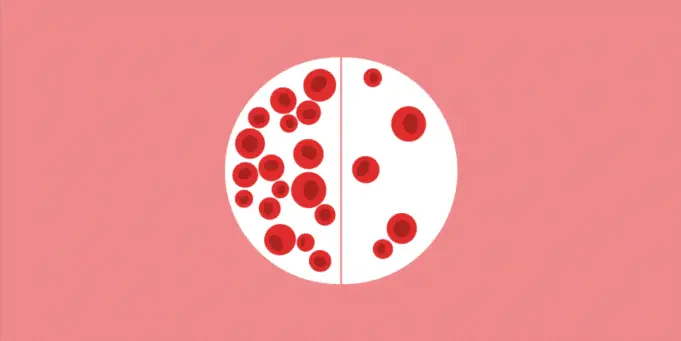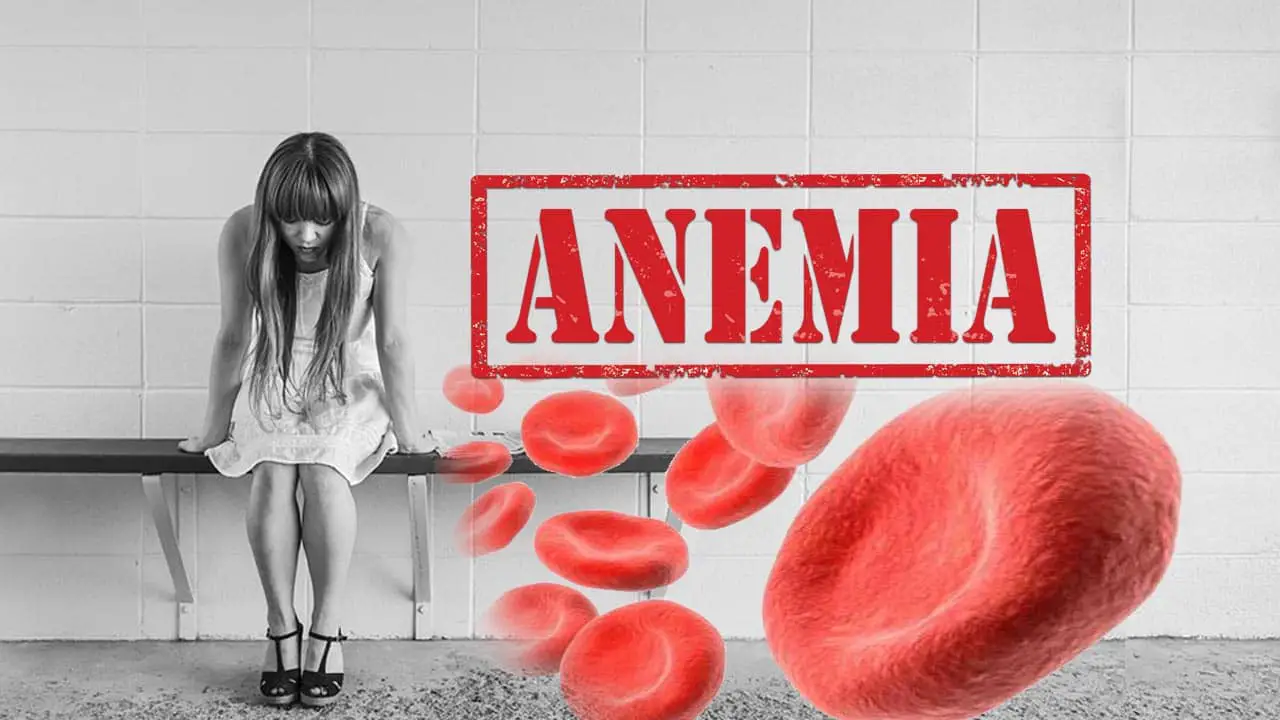Anemia is one very common condition that people deal with around the world. It happens when a person’s body does not get enough red blood cells which are the same as when they do not carry the right amount of haemoglobin, or when the blood cells do not do what they are expected to do.
It is the responsibility of the red blood cells to bring in oxygen and take out carbon dioxide from your body. If that process does not occur as it should, a person will get poisoned by carbon dioxide.
The causes and treatment for such condition varies, so we have prepared a list of various symptoms of anaemia and how to treat them
Signs of anemia
There can be different causes of anemia. It is very normal that many of us get fatigued and tired once in a while, but if you find out that most of the symptoms listed in this article apply to you, then you need to check and be sure if you are anemia free.
1. Pale skin and inside of your lower eyelids
When the human body does not get sufficient oxygen, or it suffers from a significant drop in the number of red blood cells, there is a change in the colour of the skin, and we tend to look pale.
This change in skin colour and paleness does not only apply to a person’s face but also the entire body. Translucency as a result of anemia becomes more visible in the palms, the tongue, and the inner part of a person’s lower eyelids.
2. Irregular heart rate
When the levels of hemoglobin in a person’s body become very low, it forces the heart to work extra hard to pump blood to a person’s system.
The heart has to overwork itself as it tries to provide its owner with enough energy and that could result in irregularity of a person’s heartbeat.
3. Fatigue
If the organs of our body do not get the required amount of oxygen, our body is required to work a lot harder to help with the production of energy for our daily functioning and that will eventually cause us to feel tired and fatigued.
4. Problems with concentration
Every organ in the human body require the supply of oxygen for them to function properly and the brain is not exempted.
If the available level of oxygen is lower than what is required, it becomes difficult for us to think clearly and that could make us suffer from a poor level of concentration and focus.
5. Nail thinning
If your fingernails become brittle or you notice that it develops the shape of a spoon, you might have to be concerned as this is a common symptom of malaria that is rarely paid attention to. Even your finger and toenails require the presence of oxygen for them to stay healthy.
6. Cracks on the corners of your lips
Dry or cracked lips might seem like a normal thing to some of us because we get it sometimes from exposure to the sun, wind, or cold temperatures.
However, when it comes to anaemia, there are specific areas of the lips that are likely to be affected, and the corners of the lips are usually the target.
7. Strange cravings for non-nutritive substances
Scientists are still trying to figure out why a condition like anemia will make people have such unusual needs. However, the most common substance people crave for during this time includes ice, dirt, and chalk.
Natural ways to treat anemia
There are different types of anemia which is why there are also different treatment methods for each type depending on the cause of the condition.
Improve your stomach acid levels
When the human stomach does not produce sufficient amount of acid, the human body might find it challenging to break down the food consumed to the right degree, and that will lead to malabsorption of the vitamins and minerals including vitamin B12 and iron.
What it means is that even though you get enough vitamins and minerals from the foods you eat and the supplements you take, it doesn’t get into your system thus they cannot offer you the right amount of benefits.
Ways to improve the low acid levels
Dilute one tablespoon full of apple cider vinegar into a glass of water and drink it before meal every day. You can also try ginger as it helps to stimulate the production of digestive juices. Another good option you can try out is fermented food because they help to improve digestion
Low acid levels are dangerous and can get to the point where it gives you something known as a leaky gut because food does not get digested correctly and that causes irritation of the gut lining.
Heal leaky gut
Leaky guts refer to a condition in which the lining of the small intestine gets damaged. When this occurs, toxins and undigested food particles can leak out of the intestine and find their way into the bloodstream which can cause different health issues which includes anemia.
Almost all cases of leaky guts are caused by eating an unbalanced diet which means the best way for it to be fixed is by changing the kind of foods you eat. You should try to eliminate processed foods, eliminate food sensitivities, include healthy fats such as oil and fish in your diet
Eat fermented foods
Did you know fermented foods are blessed with probiotics which are the good bacteria that will assist your digestive system to function well? Probiotics and also help with fixing the first two problems listed in this article so make sure you have plenty of them. Yogurt, raw cheese, and kefir are some examples of fermented foods you can try
Eliminate food sensitivities
The digestive system can easily be irritated by food sensitivities and that can cause leaky guts. If you can avoid any form of food intolerance it can help to heal the leak fast
Increase folate intake
Folate is one of the forms of vitamin B9, and it plays a vital role in various of our bodily functions including helping to build healthy red blood cells. Food like beans, leafy green vegetables, citrus fruits, whole grains, and papaya are rich sources of folate.
Increase B12 intake
Vitamin B12 is a very essential vitamin, especially for healthy red blood cells. People like vegetarians and pregnant women are at a higher risk of developing a vitamin B12 deficiency. Foods like eggs, meat, fish, dairy, and seafood are a great source of vitamin B12.
Increase iron intake
Iron is another element that is necessary for the proper functioning of the human body. It is an essential mineral for the production of red blood cells and its deficiency can most likely lead to anemia. You can increase your intake of iron either through food or supplement.
Some foods that are rich in iron include liver, beetroot, broccoli, grains, nuts, spinach, red meat, beans and lentis.













